A report that looked into a miracle Jesus performed over 2,000 years ago was recently retracted from a medical journal.
Virology Journal had published the article written by Chinese researchers who detailed a case of a woman with a high fever whom Jesus healed. The study's authors speculated that the woman may have had influenza.1
A few weeks after the article was published, it drew ridicule from the blogosphere, and Virology Journal retracted it with an apology.
Since modern science and technology are commonly employed to conduct research on past events, why did this particular article create such an uproar? Simply put, to borrow from the world of criminal investigation, there wasn't a "body." A columnist for LiveScience wrote:
The study's authors diagnosed the woman Jesus treated as having had influenza. Had the researchers examined some newly found document, mummified body, or other forensic evidence, that would be one thing. But using the gospels of Mark, Matthew and Luke in the New King James version of the Bible as the entire data set made "Virology Journal" look like "Mad" magazine or "The Onion."2
Considering that they were historical writers and eyewitnesses of their age, are Mark, Matthew, and Luke not to be as trusted as, for instance, Plato? About 2,000 years ago, the Greek philosopher described the lost city state of Atlantis that supposedly sank into the sea, an account that has launched many searches for its archaeological remains or other evidence of its existence.
In 2005, the scientific journal Geology, which "professional geologists and university-level students in the earth sciences use…to keep up with scientific research trends,"3 published a paper entitled "Destruction of Atlantis by a Great Earthquake and Tsunami? A geological analysis of the Spartel Bank hypothesis."4
Plato is the first writer to have mentioned the city, and other commentary on it is based on his narrative. His account also contains the involvement of the Greek god Poseidon, to whom the Hellenic gods bequeathed Atlantis. Poseidon also apparently fell in love with a mortal woman, Cleito, who bore him five pairs of male twins who all ruled the island. Yet, apparently, Plato's writings were taken seriously enough to spur not only archaeological but also geological studies.
So, what makes Plato's Atlantis account a viable clue for geologists to pursue regarding past events and Mark, Matthew, and Luke's reports not for these Chinese medical researchers? Even Darth Vader made a cameo in the journal Psychiatry Research.5 And other biblical records, including the Bethlehem star,6 have been used for scientific investigations--especially when trying to debunk them.
The point is that, unlike Star Wars, the Bible is a historical document that contains commentary which should not, and honestly cannot, be barred from the scope of scientific inquiry. Research will continue, whether "peer-reviewed" journals publish it or not.
If anything, the retraction of the article simply demonstrates at least two things: 1) the secular scientific community's willful discrimination against viewpoints contrary to its own narrow perspectives, and 2) a scientific journal's spineless ability to retreat due to the pressure of popular opinion.
References
- Hon, K. L. E. et al. 2010. Influenza or not influenza: Analysis of a case of high fever that happened 2000 years ago in Biblical time. Virology Journal. 7: 169.
- Radford, B. Medical Journal Retracts Jesus Miracle Paper. LiveScience. Posted on livescience.org August 13, 2010, accessed August 30, 2010.
- GSA Publications--Descriptions, Frequency, and Formats. The Geological Society of America. Posted on geosociety.org.
- Gutscher, M.-A. 2005. Destruction of Atlantis by a great earthquake and tsunami? A geological analysis of the Spartel Bank hypothesis. Geology. 33 (8): 685-688.
- Hsu, J. The Psychology of Darth Vader Revealed. LiveScience. Posted on livescience.com June 4, 2010, accessed August 30, 2010.
- Jenkins, R. M. 2004. The Star of Bethlehem and the comet of AD 66. Journal of the British Astronomy Association. 114 (6): 336-343.
* Ms. Dao is Assistant Editor at the Institute for Creation Research.
Article posted on September 2, 2010.














